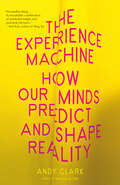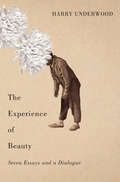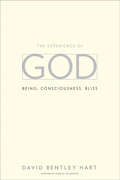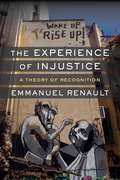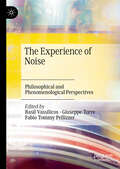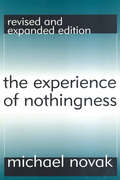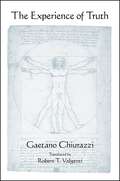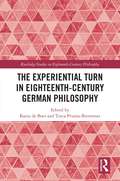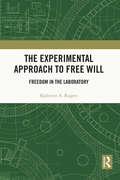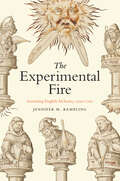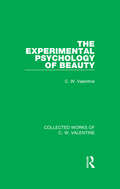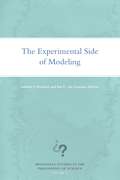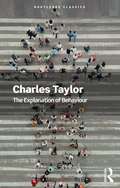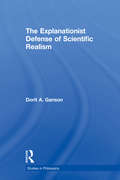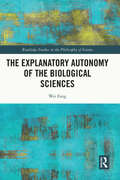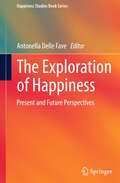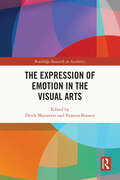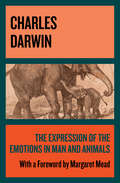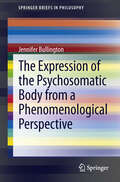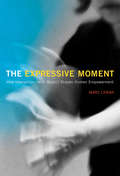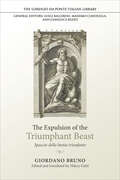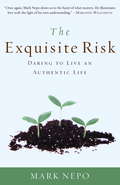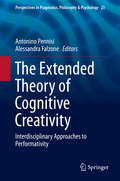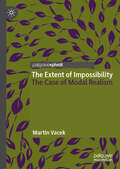- Table View
- List View
The Experience Machine: How Our Minds Predict and Shape Reality
by Andy ClarkA brilliant new theory of the mind that upends our understanding of how the brain interacts with the world&“This thoroughly readable book will convince you that the brain and the world are partners in constructing our understanding.&” —Sean Carroll, New York Times bestselling author of The Biggest Ideas in the Universe: Space, Time, and MotionFor as long as we&’ve studied human cognition, we&’ve believed that our senses give us direct access to the world. What we see is what&’s really there—or so the thinking goes. But new discoveries in neuroscience and psychology have turned this assumption on its head. What if rather than perceiving reality passively, your mind actively predicts it?Widely acclaimed philosopher and cognitive scientist Andy Clark unpacks this provocative new theory that the brain is a powerful, dynamic prediction engine, mediating our experience of both body and world. From the most mundane experiences to the most sublime, reality as we know it is the complex synthesis of sensory information and expectation. Exploring its fascinating mechanics and remarkable implications for our lives, mental health, and society, Clark nimbly illustrates how the predictive brain sculpts all human experience. Chronic pain and mental illness are shown to involve subtle malfunctions of our unconscious predictions, pointing the way towards more effective, targeted treatments. Under renewed scrutiny, the very boundary between ourselves and the outside world dissolves, showing that we are as entangled with our environments as we are with our onboard memories, thoughts, and feelings. And perception itself is revealed to be something of a controlled hallucination.Unveiling the extraordinary explanatory power of the predictive brain, The Experience Machine is a mesmerizing window onto one of the most significant developments in our understanding of the mind.
The Experience of Beauty: Seven Essays and a Dialogue
by Harry UnderwoodThe notion of beauty as a point of transit between the sensuous and the ideal is well-established in the history of Western philosophy. Describing this transition and seeking to rethink the ways in which humans understand the things they find beautiful in life, Harry Underwood’s The Experience of Beauty approaches the notion of beauty through the insights of major but distinctively individual philosophers and artists. In seven essays and a dialogue, Underwood considers the principal instances of beauty as it reveals itself in everyday experience, as a concept in the mind of the philosopher, as the artist’s vision, and as the shining image of the ideal. Considering the perspectives of many notable figures in the Western canon of philosophy and literature for whom beauty and the imagination have mattered, including Plato, Nietzsche, Auden, Coleridge, Proust, and Iris Murdoch, Underwood draws out a rounded sense of beauty. It is shown, on one view, to be inherent in a perceptible order and, on another, to be an expression of the will to confer meaning on a meaningless world. In art, beauty reveals itself to be both perceived and created, and a world-disclosing, truth-relaying force. As a final matter, Underwood asks what it means to embrace your own vision of beauty and apply it to your life’s work. A quietly provocative meditation on the mystery of beauty, this collection of essays contends that beauty serves life as an inspiration, not merely as an ornament.
The Experience of Beauty: Seven Essays and a Dialogue
by Harry UnderwoodThe notion of beauty as a point of transit between the sensuous and the ideal is well-established in the history of Western philosophy. Describing this transition and seeking to rethink the ways in which humans understand the things they find beautiful in life, Harry Underwood’s The Experience of Beauty approaches the notion of beauty through the insights of major but distinctively individual philosophers and artists. In seven essays and a dialogue, Underwood considers the principal instances of beauty as it reveals itself in everyday experience, as a concept in the mind of the philosopher, as the artist’s vision, and as the shining image of the ideal. Considering the perspectives of many notable figures in the Western canon of philosophy and literature for whom beauty and the imagination have mattered, including Plato, Nietzsche, Auden, Coleridge, Proust, and Iris Murdoch, Underwood draws out a rounded sense of beauty. It is shown, on one view, to be inherent in a perceptible order and, on another, to be an expression of the will to confer meaning on a meaningless world. In art, beauty reveals itself to be both perceived and created, and a world-disclosing, truth-relaying force. As a final matter, Underwood asks what it means to embrace your own vision of beauty and apply it to your life’s work. A quietly provocative meditation on the mystery of beauty, this collection of essays contends that beauty serves life as an inspiration, not merely as an ornament.
The Experience of God
by David Bentley HartDespite the recent ferocious public debate about belief, the concept most central to the discussion--God--frequently remains vaguely and obscurely described. Are those engaged in these arguments even talking about the same thing? In a wide-ranging response to this confusion, esteemed scholar David Bentley Hart pursues a clarification of how the word "God" functions in the worlds great theistic faiths. Ranging broadly across Judaism, Christianity, Islam, Vedantic and Bhaktic Hinduism, Sikhism, and Buddhism, Hart explores how these great intellectual traditions treat humanitys knowledge of the divine mysteries. Constructing his argument around three principal metaphysical "moments"--being, consciousness, and bliss--the author demonstrates an essential continuity between our fundamental experience of reality and the ultimate reality to which that experience inevitably points. Thoroughly dismissing such blatant misconceptions as the deists concept of God, as well as the fundamentalist view of the Bible as an objective historical record, Hart provides a welcome antidote to simplistic manifestoes. In doing so, he plumbs the depths of humanitys experience of the world as powerful evidence for the reality of God and captures the beauty and poetry of traditional reflection upon the divine.
The Experience of Injustice: A Theory of Recognition (New Directions in Critical Theory #70)
by Emmanuel RenaultIn The Experience of Injustice, the French philosopher Emmanuel Renault opens an important new chapter in critical theory. He brings together political theory, critical social science, and a keen sense of the power of popular movements to offer a forceful vision of social justice. Questioning normative political philosophy’s conception of justice, Renault gives an account of injustice as the denial of recognition, placing the experience of social suffering at the heart of contemporary critical theory.Inspired by Axel Honneth, Renault argues that a radicalized version of Honneth’s ethics of recognition can provide a systematic alternative to the liberal-democratic projects of such thinkers as Rawls and Habermas. Renault reformulates Honneth’s theory as a framework founded on experiences of injustice. He develops a complex, psychoanalytically rich account of suffering, disaffiliation, and identity loss to explain these experiences as denials of recognition, linking everyday injustice to a robust defense of the politicization of identity in social struggles. Engaging contemporary French and German critical theory alongside interdisciplinary tools from sociology, psychoanalysis, socialist political theory, social-movement theory, and philosophy, Renault articulates the importance of a theory of recognition for the resurgence of social critique.
The Experience of Noise: Philosophical and Phenomenological Perspectives
by Giuseppe Torre Basil Vassilicos Fabio Tommy PellizzerThis volume&’s aim is to stimulate philosophical interest in the experience of noise. There are at least three important open questions about noise. First, how should the relationship between noise as a scientific phenomenon and as a type of experience be understood? Is the one to be understood in terms of the other, and what implications may be drawn from this? Second, are experiences of noise strictly limited to perceptual states or to one type of perceptual state – for instance, to acoustic experiences? E.g. is there noise that is visual or tactile? Is there noise that is cognitive, affective, or evaluative? Third, how can philosophy make sense of noise in the first place? Should noise simply be relegated to the hither side of the explananda of philosophy, as the mere leftover of whatever philosophy sets out to account for; meaning, being, totality, etc.? Or may noise be understood as a positive phenomenon in its own right, which has its own distinctive features and content, difficult though they might be to pin down? This volume will contribute to the burgeoning philosophy of noise by highlighting how contemporary philosophical perspectives with a phenomenological or experiential bent can make inroads to these questions about a fascinating yet little understood quarter of human experience.
The Experience of Nothingness
by Michael NovakIn The Experience of Nothingness, Michael Novak has two objectives. First, he shows the paths by which the experience of nothingness is becoming common among all those who live in free societies. Second, he details the various experiences that lead to the nothingness point of view. Most discussions of these matters have been so implicated in the European experience that the term nihilism has a European ring. Novak, however, articulates this experience of formlessness in an American context.In his new introduction, the author lists four requirements that must be met by an individual in order for the experience of nothingness to emerge: a commitment to honesty, a commitment to courage, recognition of how widespread the experience of nothingness is, and a virtue of will. Novak writes that these principles are what guide self-described philosophical nihilists. But many people simply borrow the nihilistic conclusions without observing the moral commitments to them. For this reason Novak believes that nihilism is fraudulent as a theory intended to explain the experience of nothingness. Nihilism in practice, he maintains, often results in a form of intolerance. The Experience of Nothingness is a work that will cause many scholars to rethink their beliefs. It should be read by philosophers, theologians, sociologists, political theorists, and cultural historians.
The Experience of Truth (SUNY series in Contemporary Italian Philosophy)
by Gaetano ChiurazziWhat does it mean to say that something is true? In this book Gaetano Chiurazzi argues that when we say that something is true, we do not say something merely about a state of affairs, but also about ourselves. Truth is not just the fact of "what is out there," but a mode of existence that shapes and transforms human understanding. Supported by an original reading of Aristotle's theory of judgment and Heidegger's hermeneutical theory of truth, Chiurazzi also engages the work of Nietzsche, Gadamer, Putnam, and Rorty to challenge the rising tide of theories that dismiss the importance of human experience to the idea of truth.
The Experiential Turn in Eighteenth-Century German Philosophy (Routledge Studies in Eighteenth-Century Philosophy)
by Karin de Boer, Tinca Prunea-BretonnetThis collection of essays challenges the prevailing assumption that eighteenth-century German philosophy prior to Kant was largely defined by post-Leibnizian rationalism and, accordingly, a low esteem of the cognitive function of the senses. It does so by highlighting the various ways in which eighteenth-century German philosophers reconceived the notion and role of experience in their efforts to identify, defend, and contest the contribution of sensibility to disciplines such as metaphysics, theology, the natural sciences, psychology, and aesthetics. Engaging in depth with Tschirnhaus, Wolff, the Wolffians, eclecticism, Popularphilosophie, the Berlin Academy, Tetens, and Kant, its thirteen chapters present a more nuanced understanding of the German reception of British and French ideas and dismiss the prevailing view that German philosophy was largely isolated from European debates. Moreover, the book introduces a number of relatively unknown, but highly relevant philosophers and developments to non-specialized scholars and contributes to a better understanding of the richness and complexity of the German Enlightenment.
The Experimental Approach to Free Will: Freedom in the Laboratory
by Katherin A RogersRecently, psychologists and neurobiologists have conducted experiments taken to show that human beings do not have free will. Many, including a number of philosophers, assume that, even if science has not decided the free will question yet, it is just a matter of time. In The Experimental Approach to Free Will, Katherin A. Rogers accomplishes several tasks. First, canvasing the literature critical of these recent experiments (or of conclusions drawn from them) and adding new criticisms of her own, she shows why these experiments should not undermine belief in human freedom – even robust, libertarian freedom. Indeed, many of the experiments do not even connect with any philosophical understanding of free will. Through this discussion, she generates a long list of problems – ethical as well as practical – facing the attempt to study free will experimentally. With these problems highlighted, she shows that even in the distant future, supposing the brain sciences to have advanced far beyond where they are today, it will likely be impossible to settle the question of free will experimentally. She concludes that, since philosophy has not, and science cannot, settle the question of free will, it is more reasonable to suppose that humans do indeed have freedom. Brings together, and adds to, criticisms of recent experiments (or conclusions drawn from them) which supposedly show that human beings do not have free will Analyzes recent experiments supposedly related to human freedom through the lens of a philosophically informed portrait of a robust, libertarian free choice Develops a long list of problems – both practical and ethical – facing the experimental study of human freedom Proposes a thought experiment set in a distant future of advanced brain science to show that it is likely impossible for science ever to settle the question of free will.
The Experimental Fire: Inventing English Alchemy, 1300–1700 (Synthesis)
by Jennifer M. Rampling“Presents the largely uncharted history of English alchemy from its medieval roots until the end of the seventeenth century . . . an astounding eye for detail.” —Annals of ScienceIn medieval and early modern Europe, the practice of alchemy promised extraordinary physical transformations. Who would not be amazed to see base metals turned into silver and gold, hard iron into soft water, and deadly poison into elixirs that could heal the human body? To defend such claims, alchemists turned to the past, scouring ancient books for evidence of a lost alchemical heritage and seeking to translate their secret language and obscure imagery into replicable, practical effects.Tracing the development of alchemy in England over four hundred years, from the beginning of the fourteenth century to the end of the seventeenth, Jennifer M. Rampling illuminates the role of alchemical reading and experimental practice in the broader context of national and scientific history. Using new manuscript sources, she shows how practitioners like George Ripley, John Dee, and Edward Kelley, as well as many previously unknown alchemists, devised new practical approaches to alchemy while seeking the support of English monarchs. By reconstructing their alchemical ideas, practices, and disputes, Rampling reveals how English alchemy was continually reinvented over the space of four centuries, resulting in changes to the science itself. In so doing, The Experimental Fire bridges the intellectual history of chemistry and the wider worlds of early modern patronage, medicine, and science.“An engaging piece of scholarly work . . . it humanizes the alchemist, showing him or her to be a historical personage caught up in the circumstances of the era and seeking to survive the upheavals and challenges of historical reality . . . bound to make an important contribution to the history of science, social history, history of scholarship, and the history of the book.” —Early Science and Medicine
The Experimental Psychology of Beauty: The Experimental Psychology Of Beauty (Collected Works of C.W. Valentine)
by C.W. ValentineOriginally published in 1962, the experimental study of aesthetics was a field particularly associated with the name of C.W. Valentine, who in this book provided a critical review of research carried out since the end of the nineteenth century principally by British and American psychologists. The investigations described, many of them conducted by the author, are concerned with individual responses to what is commonly regarded as beautiful in painting, music, and poetry, an important distinction being made between the perception of objects as ‘beautiful’ as opposed to ‘pleasing’. The reactions of children and adults, and of people having different ethnic and social backgrounds, are explored in a variety of experiments dealing with specific elements, including colour, form, and balance in painting; musical intervals, discord, harmony, melody, and tempo; and rhythm, metre, imagery, and associations in classical and romantic poetry. Other experiments seek to disclose the temperamental and attitudinal factors underlying individual differences in the judgement and appreciation of specific works of art. Of particular interest are the studies of responses to modern paintings, poems and musical compositions. The findings throw light on the development of discrimination and taste and suggest the possibility of some common factor in the appreciation of these three arts. It was felt that critics as well as psychologists and aestheticians would find much to encourage reflection and to stimulate further research.
The Experimental Side of Modeling (Minnesota Studies in the Philosophy of Science)
by Isabelle F. Peschard Bas C. van FraassenAn innovative, multifaceted approach to scientific experiments as designed by and shaped through interaction with the modeling process The role of scientific modeling in mediation between theories and phenomena is a critical topic within the philosophy of science, touching on issues from climate modeling to synthetic models in biology, high energy particle physics, and cognitive sciences. Offering a radically new conception of the role of data in the scientific modeling process as well as a new awareness of the problematic aspects of data, this cutting-edge volume offers a multifaceted view on experiments as designed and shaped in interaction with the modeling process.Contributors address such issues as the construction of models in conjunction with scientific experimentation; the status of measurement and the function of experiment in the identification of relevant parameters; how the phenomena under study are reconceived when accounted for by a model; and the interplay between experimenting, modeling, and simulation when results do not mesh. Highlighting the mediating role of models and the model-dependence (as well as theory-dependence) of data measurement, this volume proposes a normative and conceptual innovation in scientific modeling—that the phenomena to be investigated and modeled must not be precisely identified at the start but specified during the course of the interactions arising between experimental and modeling activities.Contributors: Nancy D. Cartwright, U of California, San Diego; Anthony Chemero, U of Cincinnati; Ronald N. Giere, U of Minnesota; Jenann Ismael, U of Arizona; Tarja Knuuttila, U of South Carolina; Andrea Loettgers, U of Bern, Switzerland; Deborah Mayo, Virginia Tech; Joseph Rouse, Wesleyan U; Paul Teller, U of California, Davis; Michael Weisberg, U of Pennsylvania; Eric Winsberg, U of South Florida.
The Explanation of Behaviour (Routledge Classics)
by Charles TaylorThe Explanation of Behaviour was the first book written by the renowned philosopher Charles Taylor. A vitally important work of philosophical anthropology, it is a devastating criticism of the theory of behaviourism, a powerful explanatory approach in psychology and philosophy when Taylor's book was first published. However, Taylor has far more to offer than a simple critique of behaviourism. He argues that in order to properly understand human beings, we must grasp that they are embodied, minded creatures with purposes, plans and goals, something entirely lacking in reductionist, scientific explanations of human behaviour. Taylor’s book is also prescient in according a central place to non-human animals, which like human beings are subject to needs, desires and emotions. However, because human beings have the unique ability to interpret and reflect on their own actions and purposes and declare them to others, Taylor argues that human experience differs to that of other animals. Furthermore, the fact that human beings are often directed by their purposes has a fundamental bearing on how we understand the social and moral world. Taylor’s classic work is essential reading for those in philosophy and psychology as well as related areas such as sociology and religion. This Routledge Classics edition includes a new Preface by the author and a new Foreword by Alva Noë, setting the book in philosophical and historical context.
The Explanationist Defense of Scientific Realism
by Dorit A. GansonGanson offers new hope in this work for the defense of scientific realism by undermining powerful anti-realist objections and advocating an abandonment of naturalist and externalist strategies.
The Explanatory Autonomy of the Biological Sciences (Routledge Studies in the Philosophy of Science)
by Wei FangThis book argues for the explanatory autonomy of the biological sciences. It does so by showing that scientific explanations in the biological sciences cannot be reduced to explanations in the fundamental sciences such as physics and chemistry and by demonstrating that biological explanations are advanced by models rather than laws of nature. To maintain the explanatory autonomy of the biological sciences, the author argues against explanatory reductionism and shows that explanation in the biological sciences can be achieved without reduction. Then, he demonstrates that the biological sciences do not have laws of nature. Instead of laws, he suggests that biological models usually do the explanatory work. To understand how a biological model can explain phenomena in the world, the author proposes an inferential account of model explanation. The basic idea of this account is that, for a model to be explanatory, it must answer two kinds of questions: counterfactual-dependence questions that concern the model itself and hypothetical questions that concern the relationship between the model and its target system. The reason a biological model can answer these two kinds of questions is due to the fact that a model is a structure, and the holistic relationship between the model and its target warrants the hypothetical inference from the model to its target and thus helps to answer the second kind of question. The Explanatory Autonomy of the Biological Sciences will be of interest to researchers and advanced students working in philosophy of science, philosophy of biology and metaphysics.
The Exploration of Happiness
by Antonella Delle FaveThis specially selected collection of landmark work from the Journal of Happiness Studies maps the current contours, and the likely future direction, of research in a field with a fast-rising profile. This volume, which inaugurates a series aiming to explore discrete topics in happiness and wellbeing studies, features selected articles published in the Journal of Happiness Studies during its first decade, which culminated in an 'impact factor' in 2011. As the introductory work in the series, it provides readers with a vital overview of the prominent issues, problems and challenges that well-being and happiness research has had to overcome since its appearance on the scientific stage. The journal's very success evinces both the high scientific quality of the research covered, and the steadily growing interest in a subject that draws responses from a vast range of epistemological aiming points, taking in economics, sociology, psychology, philosophy, education and medicine. The series of volumes following this debut publication will represent a unique contribution to the literature in their multidisciplinary focus on particularized topics. It is reckoned that this will help strengthen cross-disciplinary synergies among authors investigating the same topic, as well as whet the appetite for happiness research among professionals and experts inhabiting a variety of academic domains. This volume addresses the theory of well-being and happiness, the different research approaches now probing their features and components, and the socio-economic and cultural issues that impact on their promotion..
The Expression of Emotion in the Visual Arts (Routledge Research in Aesthetics)
by Vanessa BrasseyThe visual arts have long been held to have an intimate link with emotions. Despite this, the topic remains underexplored; when the expression of emotion is discussed, it is usually in relation to music.This volume corrects this lacuna and presents a variety of perspectives on the expression of emotion in the visual arts with contributions from both established and early career academics. There are chapters on the empathy theory of beauty; enaction and artistic expression; emotion and experimental psychology; a ‘persona’ theory of visual expression; and self-expression in portraiture. There are also chapters discussing the contributions to the topic by Susanne Langer and Richard Wollheim as well as a chapter comparing the work of R.G. Collingwood and Maurice Merleau-Ponty.The Expression of Emotion in the Visual Arts will be of interest to students and researchers in the philosophy of art and aesthetics, as well as those interested in conceptual issues in the visual arts.
The Expression of the Emotions in Man and Animals
by Charles DarwinWith a foreword by Margaret Mead: Darwin examines genetically determined behavior, combining the science of evolution with insights into human psychology.Published in 1872, thirteen years after On the Origin of Species, The Expression of the Emotions in Man and Animals is devoted to documenting what Darwin believes is the genetically determined aspects of behavior. Together with The Descent of Man (1871), it sketches out Darwin&’s main thesis of human origins. Here he traces the animal origins of human characteristics such as pursing of the lips in concentration, tightening of the muscles around the eyes in anger and efforts of memory. Darwin&’s thesis is that if the outward signs of behavior and emotions are shown to be universal in man and similar to animals then they must be due to inherited evolutionary adaptation, not culturally acquired characteristics. Several British psychiatrists, in particular James Crichton-Browne, were consultants for the book, which forms Darwin&’s main contribution to psychology. Darwin&’s collection of detailed observations along with his acute observational abilities and pictures (a landmark in the history of illustrations within the body of the text) corroborate his thesis and form the basis of the book. The foreword by Margaret Mead is of great interest in and of itself. Her foreword, illustrated with pictures provided by her, is designed to subvert Darwin&’s chief idea. Paul Ekman, a later editor of this same work, &“wonder[s] how Darwin would have felt had he known that his book was introduced by a cultural relativist who had included in his book pictures of those most opposed to his theory.&”
The Expression of the Psychosomatic Body from a Phenomenological Perspective
by Jennifer BullingtonThis book is a contribution to the understanding of psychosomatic health problems. Inspired by the work of the French phenomenologist Maurice Merleau-Ponty, a phenomenological theory of psychosomatics is worked out as an alternative to traditional, biomedical thinking. The patient who presents somatic symptoms with no clearly discernible lesion or dysfunction presents a problem to the traditional health care system. These symptoms are medically unexplainable, constituting an anomaly for the materialistic understanding of ill health that underlies the practice of modern medicine. The traditional biomedical model is not appropriate for understanding a number of health issues that we call "psychosomatic" and for this reason, biomedical theory and practice must be complemented by another theoretical understanding in order to adequately grasp the psychosomatic problematic. This book establishes a complementary understanding of psychosomatic ill health in terms of a non-reductionistic model allowing for the (psychosomatic) expression of the lived body. A thorough presentation of the work Merleau-Ponty is followed by the author's application of his thinking to the phenomenon of psychosomatic pathology.
The Expressive Moment: How Interaction (with Music) Shapes Human Empowerment
by Marc LemanA new way to understand expressive interaction, focusing on the dynamic, fast, pre-reflective processes underlying interactions with music.The expressive moment is that point in time when we grasp a situation and respond quickly, even before we are aware of it. In this book, Marc Leman argues that expression drives this kind of interaction, and he proposes a general framework for understanding expressive interactions. He focuses on the dynamic, fast, and pre-reflective processes underlying our interactions with music—whether we are playing an instrument, dancing, listening, or using new interactive technologies. Music offers a well-established domain for studying these fast and interactive processes, and Leman argues that understanding the power of expressive interaction through music may help us understand cognitive processing in other domains, including language, human action coordination, human-animal interaction, and human-machine interaction.Leman regards expressive interactions with music as energizing and empowering. He argues that music is based on patterns that intervene with a reinforcing loop in the human brain, strengthening learning, motivation, and reward. He argues further that the reinforcing effect is influenced by the interaction flow, by fast processes that handle expressive qualities on the fly.Leman sets out the framework in which expressive interaction is situated, describing, among other things, a pragmatic model of communication in which the fundamental components are enactment and dynamics. He looks in more detail at the cognitive-motivational architecture, discussing sensorimotor and motivational schemes. Finally, he discusses applications for the concepts behind expressive motivation in such fields as sports, entertainment, rehabilitation, multimedia art, and music education.
The Expulsion of the Triumphant Beast: Spaccio della bestia trionfante (Lorenzo Da Ponte Italian Library)
by Giordano BrunoPublished in London in 1584, The Expulsion of the Triumphant Beast is Giordano Bruno’s first work of moral philosophy. It is dedicated with a long Explicatory Letter to Elizabeth I’s most cultured courtier, Sir Philip Sidney. It is a book about moral reform, expelling the beasts of evil, and putting virtues in their place. Its theme is presented as an allegorical drama in which ancient myths assume modern meanings questioning the ways in which moral and religious reform have been conceived in both the ancient world and the cultures of Renaissance Europe. This new Italian text, based on the original printed text of 1584 held in the British Library, presents a less modernized version than those presently available, while maintaining a modern page format. The aim is to provide a text closer to the sound of Bruno’s original mix of classical Tuscan Italian and Neapolitan dialectical forms. This edition also presents a new translation designed to render Bruno’s complex and baroque Italian into easily readable modern English. Hilary Gatti introduces The Expulsion of the Triumphant Beast, underlining Bruno’s meta-literary reflection on the nature of allegory and myth as well as the dramatic structure of his text. Drama, philosophy, and religion combine in this work to give an epic dimension to the perennial cosmic battle between evil and good.
The Exquisite Risk: Daring to Live an Authentic Life
by Mark NepoIn these fast-paced times, the exquisite risk facing each of us every day is to slow down and "still our own house" so that we may experience life rather than simply manage it. In The Exquisite Risk, poet and teacher Mark Nepo encourages readers to become quiet enough and open enough to listen to what truly matters--our own hearts, our loved ones, the wonders of nature--in order to live a life with nothing held back. In rich, lyrical prose, Nepo shares his own spiritual path, including a battle with illness that helped him understand how only by daring to embrace all that life has to offer can we come to a deeper appreciation of its meaning and beauty. In the spirit of works by Deepak Chopra and Ram Dass,The Exquisite Risk unfolds in chapters like "The Struggle to Be Real," "There Are Teachers Everywhere," "The Rhythm of Kindness," and "The Gift of Surprise," offering fresh perspective on the art of being alive and providing essential insight into how we can minimize what stands between us and our experience of life.
The Extended Theory of Cognitive Creativity: Interdisciplinary Approaches to Performativity (Perspectives in Pragmatics, Philosophy & Psychology #23)
by Antonino Pennisi Alessandra FalzoneThis edited volume focuses on the hypothesis that performativity is not a property confined to certain specific human skills, or to certain specific acts of language, nor an accidental enrichment due to creative intelligence. Instead, the executive and motor component of cognitive behavior should be considered an intrinsic part of the physiological functioning of the mind, and as endowed with self-generative power. Performativity, in this theoretical context, can be defined as a constituent component of cognitive processes. The material action allowing us to interact with reality is both the means by which the subject knows the surrounding world and one through which he experiments with the possibilities of his body. This proposal is rooted in models now widely accepted in the philosophy of mind and language; in fact, it focuses on a space of awareness that is not in the individual, or outside it, but is determined by the species-specific ways in which the body acts on the world. This theoretical hypothesis will be pursued through the latest interdisciplinary methodology typical of cognitive science, that coincide with the five sections in which the book is organized: Embodied, enactivist, philosophical approaches; Aesthetics approaches; Naturalistic and evolutionary approaches; Neuroscientific approaches; Linguistics approaches. This book is intended for: linguists, philosophers, psychologists, cognitive scientists, scholars of art and aesthetics, performing artists, researchers in embodied cognition, especially enactivists and students of the extended mind.
The Extent of Impossibility: The Case of Modal Realism
by Martin VacekThe book examines the notion of impossible worlds. Although the notion of an impossible world is not novel, several misunderstandings and misrepresentations have resulted in philosophical confusion. To avoid such confusion, the analysis here differentiates between the logical, semantic, epistemological, and metaphysical roles of impossible worlds. The book's central hypothesis is that an understandable taxonomy of extreme positions about impossible worlds is required; it is not easy to hold the middle ground without taking the extreme positions seriously. These positions are compared in order to draw important lessons for logic, epistemology, and metaphysics. The Extent of Impossibility is essential reading for scholars in philosophy and especially for scholars and researchers focusing on metaphysics, logic and epistemology.
